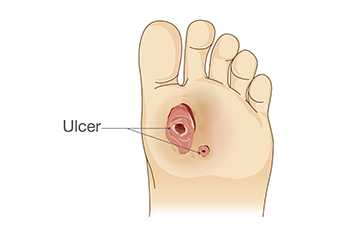
Neuropathy, a condition often associated with diabetes but not exclusive to it, refers to nerve damage that can result in loss of sensation in the feet. Non-diabetic foot wounds stemming from neuropathy occur due to the inability to perceive pain or pressure, leading to unnoticed injuries that can worsen into ulcers. Without proper sensation, individuals may continue walking on injured feet, exacerbating the wounds. Podiatrists play an important role in managing these ulcers by conducting thorough assessments to determine the extent of damage, implementing preventive measures to alleviate pressure on affected areas, and initiating treatment plans tailored to individual needs. This may involve wound care, infection management, offloading techniques to reduce pressure on the wound site, and patient education on foot care practices to prevent further complications. If you have a foot wound of any type, it is suggested that you schedule an appointment with a podiatrist for immediate treatment.
Wound care is an important part in dealing with diabetes. If you have diabetes and a foot wound or would like more information about wound care for diabetics, consult with Brandon M. Zuklie, DPM from New Jersey. Our doctor will assess your condition and provide you with quality foot and ankle treatment.
What Is Wound Care?
Wound care is the practice of taking proper care of a wound. This can range from the smallest to the largest of wounds. While everyone can benefit from proper wound care, it is much more important for diabetics. Diabetics often suffer from poor blood circulation which causes wounds to heal much slower than they would in a non-diabetic.
What Is the Importance of Wound Care?
While it may not seem apparent with small ulcers on the foot, for diabetics, any size ulcer can become infected. Diabetics often also suffer from neuropathy, or nerve loss. This means they might not even feel when they have an ulcer on their foot. If the wound becomes severely infected, amputation may be necessary. Therefore, it is of the upmost importance to properly care for any and all foot wounds.
How to Care for Wounds
The best way to care for foot wounds is to prevent them. For diabetics, this means daily inspections of the feet for any signs of abnormalities or ulcers. It is also recommended to see a podiatrist several times a year for a foot inspection. If you do have an ulcer, run the wound under water to clear dirt from the wound; then apply antibiotic ointment to the wound and cover with a bandage. Bandages should be changed daily and keeping pressure off the wound is smart. It is advised to see a podiatrist, who can keep an eye on it.
If you have any questions, please feel free to contact our offices located in Piscataway, Jamesburg, and Branchburg, NJ . We offer the newest diagnostic and treatment technologies for all your foot care needs.

Bunions are bony protrusions that form at the base of the big toe, causing it to lean inward toward the other toes. Bunions often result from a combination of genetic factors, wearing improper footwear, and structural issues in the foot. As the bunion develops, it can lead to pain, inflammation, and difficulty with shoe wear. In severe cases, complications such as bursitis, hammertoes, or even arthritis may arise due to the altered foot mechanics. If you have a bunion that is causing significant discomfort and interfering with your daily activities, it is suggested that you schedule an appointment with a podiatrist who can offer you various treatment options.
If you are suffering from bunions, contact Brandon M. Zuklie, DPM of New Jersey. Our doctor can provide the care you need to keep you pain-free and on your feet.
What Is a Bunion?
A bunion is formed of swollen tissue or an enlargement of boney growth, usually located at the base joint of the toe that connects to the foot. The swelling occurs due to the bones in the big toe shifting inward, which impacts the other toes of the foot. This causes the area around the base of the big toe to become inflamed and painful.
Why Do Bunions Form?
Genetics – Susceptibility to bunions are often hereditary
Stress on the feet – Poorly fitted and uncomfortable footwear that places stress on feet, such as heels, can worsen existing bunions
How Are Bunions Diagnosed?
Doctors often perform two tests – blood tests and x-rays – when trying to diagnose bunions, especially in the early stages of development. Blood tests help determine if the foot pain is being caused by something else, such as arthritis, while x-rays provide a clear picture of your bone structure to your doctor.
How Are Bunions Treated?
- Refrain from wearing heels or similar shoes that cause discomfort
- Select wider shoes that can provide more comfort and reduce pain
- Anti-inflammatory and pain management drugs
- Orthotics or foot inserts
- Surgery
If you have any questions, please feel free to contact our offices located in Piscataway, Jamesburg, and Branchburg, NJ . We offer the newest diagnostic and treatment technologies for all your foot care needs.

Maintaining healthy feet is essential for overall well-being. An easy foot care routine combines at-home care with professional guidance from a podiatrist. Start with regular at-home pedicures, soaking feet in warm water with Epsom salts to soften skin, followed by gentle exfoliation and moisturizing to prevent dryness and cracking. Trim toenails straight across to avoid ingrown nails and file them smooth. Seeing a podiatrist is equally important for comprehensive foot health. Regular check-ups with a podiatrist can detect early signs of issues like bunions, corns, or fungal infections. A podiatrist can also provide personalized advice on proper footwear, foot exercises, and preventive measures. If you want to invest time into taking proper care of your feet, it is suggested that you schedule an appointment with a podiatrist for thorough foot maintenance and early intervention for any underlying conditions.
Everyday foot care is very important to prevent infection and other foot ailments. If you need your feet checked, contact Brandon M. Zuklie, DPM from New Jersey. Our doctor can provide the care you need to keep you pain-free and on your feet.
Everyday Foot Care
Often, people take care of their bodies, face and hair more so than they do for their feet. But the feet are a very important aspect of our bodies, and one that we should pay more attention to. Without our feet, we would not be able to perform most daily tasks.
It is best to check your feet regularly to make sure there are no new bruises or cuts that you may not have noticed before. For dry feet, moisturizer can easily be a remedy and can be applied as often as necessary to the affected areas. Wearing shoes that fit well can also help you maintain good foot health, as well as making it easier to walk and do daily activities without the stress or pain of ill-fitting shoes, high heels, or even flip flops. Wearing clean socks with closed shoes is important to ensure that sweat and bacteria do not accumulate within the shoe. Clean socks help to prevent Athlete’s foot, fungi problems, bad odors, and can absorb sweat.
If you have any questions please feel free to contact our offices located in Piscataway, Jamesburg, and Branchburg, NJ . We offer the newest diagnostic and treatment technologies for all your foot and ankle needs.

A broken ankle, or ankle fracture, occurs when one or more bones in the ankle joint break. This injury often happens due to a sudden twisting motion, direct impact, or a fall. Symptoms include pain, swelling, bruising, and difficulty bearing weight on the affected ankle. Treatment typically involves immobilization with a cast or brace, rest, elevation, and pain management. In some cases, surgery may be necessary to realign the bones or stabilize severe fractures. Podiatrists provide treatment and management of broken ankles, provide expert diagnosis, and coordinate treatment plans. Additionally, they can monitor the healing progress and offer rehabilitation guidance to restore function and prevent future complications. If you have sustained an ankle fracture, it is suggested that you schedule an appointment with this type of health professional.
Broken ankles need immediate treatment. If you are seeking treatment, contact Brandon M. Zuklie, DPM from New Jersey. Our doctor can provide the care you need to keep you pain-free and on your feet.
Broken Ankles
A broken ankle is experienced when a person fractures their tibia or fibula in the lower leg and ankle area. Both of these bones are attached at the bottom of the leg and combine to form what we know to be our ankle.
When a physician is referring to a break of the ankle, he or she is usually referring to a break in the area where the tibia and fibula are joined to create our ankle joint. Ankles are more prone to fractures because the ankle is an area that suffers a lot of pressure and stress. There are some obvious signs when a person experiences a fractured ankle, and the following symptoms may be present.
Symptoms of a Fractured Ankle
- Excessive pain when the area is touched or when any pressure is placed on the ankle
- Swelling around the area
- Bruising of the area
- Area appears to be deformed
If you suspect an ankle fracture, it is recommended to seek treatment as soon as possible. The sooner you have your podiatrist diagnose the fracture, the quicker you’ll be on the way towards recovery.
If you have any questions, please feel free to contact our offices located in Piscataway, Jamesburg, and Branchburg, NJ . We offer the newest diagnostic and treatment technologies for all your foot care needs.
